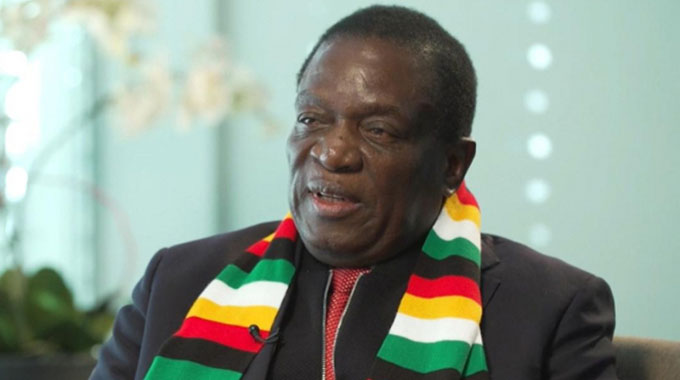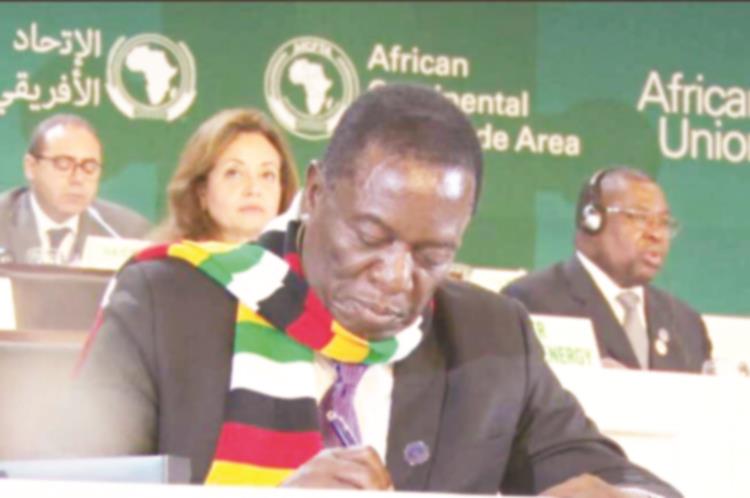Zim in top 4 investor targeted states: Poll

Lawson Mabhena Assistant News Editor
Investor confidence towards Zimbabwe has grown positively under the administration of President Mnangagwa, a recent poll by respected US consultancy firm Frontier Strategy Group has revealed.
Zimbabwe, the consultancy firm said, had jumped to fourth on the list of countries in Southern Africa where Africa-focused leaders of multinational firms see the best opportunities whereas under the Mugabe administration, Zimbabwe did not feature at all as an investment destination.
Since assuming office, President Mnangagwa has burnt the midnight oil to improve the ease of doing business in Zimbabwe and market the country as an attractive investment destination, a development that even those of honest disposition in MDC-T have lauded.
Former MDC-T policy advisor and Bulawayo legislator Mr Eddie Cross recently told Parliament that the new dispensation had ushered in new investor confidence, with the Government negotiating investment deals worth over $3 billion with thousands of prospective investors visiting every day.
Commenting on the recent poll survey results to CNBC and Wall Street Journal in separate interviews, Frontier Strategy Group practice leader for Sub-Saharan Africa Mr William Artwell said local bank executives revealed that they were overwhelmed by inquiries from prospective investors, the largest amount of interest in Zimbabwe in years.
Mr Artwell said investors are attracted to Zimbabwe’s “resource endowments, large middle class, and skilled talent pool”.
“Senior executives from major local banks I spoke to say the upswing in inbound queries by prospective investors is the highest they’ve seen in many years,” he told CNBC.
Mr Artwell, who was recently in Harare told the Journal: “Investment is taking off. Pepsi is expanding its capacity there, Unilever is investing in extra capacity and Nigerian cement maker Dangote is reportedly looking at an acquisition. There is also quite a significant up-tick in mining investment interest.
“Optimism in the business community is palpable.”
Interest in Zimbabwe has been growing ever since President Mnangagwa took over as the country’s second executive President after Mr Robert Mugabe resigned on November 21 last year.
President Mnangagwa immediately got down to business after being sworn in on November 24, declaring that the economy would grow in 2018 “supported by the rebound in agriculture and mining”. The President has since addressed inhibiting policies in the country’s laws, promoted the ease of doing business and has been on an international offensive to show that Zimbabwe is open for business.
Government expects approved investment proposals to reach a record $2,5 billion this year, on the back of growing positive investor sentiment and interest following the political changes.
In a joint article for the Harvard Business Review — a 95-year-old US international management magazine — Anna Rosenburg and Attwell noted that multinational companies with an appetite for risk could benefit from first-mover advantages by investing in Zimbabwe.
“Mnangagwa is also taking steps to shift the culture in Government towards assisting, rather than inhibiting business,” the article reads in part.
Speaking at a recent Financial Markets Indaba in South Africa, Mauritius Investment Attache’, Trade and Investment global outreach Maheswa Oodit, said following the change in the country’s administration, there has been growing enquiries from potential investors interested in Zimbabwe.
In an interview with CNBC on Monday, Charles Laurie, director and head of politics at consultancy Verisk Maplecroft observed that South African investors where likely to benefit most from Zimbabwe’s economic turnaround.
“South African investors will play a critical role in any turnaround of Zimbabwe’s economy, given the countries’ close geographic proximity, long-standing business ties and historically amicable political relations,” He said.
“Infrastructure links, close banking ties and established working relationships mean that South African businesses recognize their unique first-mover advantage over Western competitors in capitalizing on early entry into Zimbabwe.
“Both countries are now led by successful businessmen and not by political dinosaurs. If both leaders can build on early progress towards a more pragmatic business-focused policy agenda, the stage is set for a significant uptick in cross-border trade.”
Frontier Strategy Group forecasts gross domestic investment in Zimbabwe to grow by 3.2 percent this year, and by 4 percent in 2019.











Comments